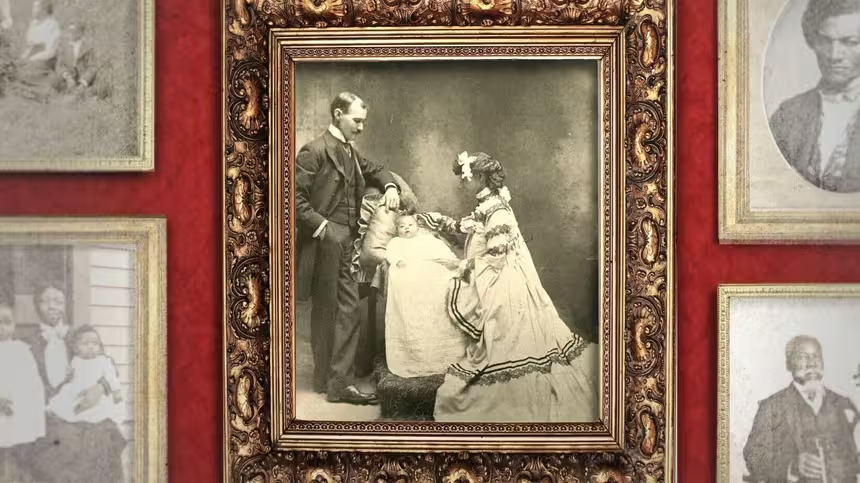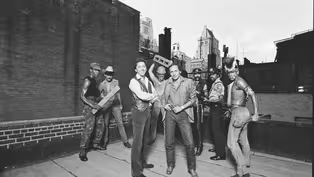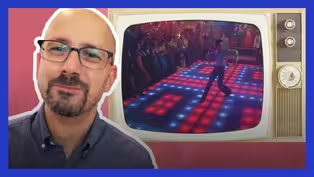
Chapter 1 |The War on Disco
Clip: Season 35 Episode 9 | 10mVideo has Closed Captions
Watch a preview of The War on Disco.
Watch a preview of The War on Disco.
Problems playing video? | Closed Captioning Feedback
Problems playing video? | Closed Captioning Feedback
Corporate sponsorship for American Experience is provided by Liberty Mutual Insurance and Carlisle Companies. Major funding by the Alfred P. Sloan Foundation.

Chapter 1 |The War on Disco
Clip: Season 35 Episode 9 | 10mVideo has Closed Captions
Watch a preview of The War on Disco.
Problems playing video? | Closed Captioning Feedback
How to Watch American Experience
American Experience is available to stream on pbs.org and the free PBS App, available on iPhone, Apple TV, Android TV, Android smartphones, Amazon Fire TV, Amazon Fire Tablet, Roku, Samsung Smart TV, and Vizio.
Buy Now

When is a photo an act of resistance?
For families that just decades earlier were torn apart by chattel slavery, being photographed together was proof of their resilience.Providing Support for PBS.org
Learn Moreabout PBS online sponsorship("Stayin' Alive" by the Bee Gees fading in) ("Stayin' Alive" playing) ♪ ♪ FELIPE ROSE: "Saturday Night Fever," the soundtrack, "Stayin' Alive," you know, that walk of John Travolta.
He's wearing his, you know, bell-bottoms with his platform shoes.
♪ ♪ That walk with the song is really what catapulted disco right over the top, made it so mainstream around the world.
♪ Night fever, night fever ♪ Disco was everywhere at this time.
You were getting constant messages that you had to look a certain way.
♪ Night fever, night fever ♪ DAVE LOGAN: A lot of people just felt like they were being excluded because they weren't cool enough to get into the disco.
♪ Dancin', yeah ♪ STEVE DAHL: I don't think we need to feel stupid because we can't be part of this new trendy thing that's happening, when it's ridiculous.
(song slowing down) (song slows to stop) There was a before and there was an after.
(rock guitar playing) REPORTER: 50,000 people showed up at Chicago's Comiskey Park.
Many had come for Disco Demolition Night.
Disco sucks.
DAHL: You don't like the Village People?
(crowd boos) JIM HANKES: They had the idea of blowing up these disco records... (chanting): Disco sucks.
HANKES: ...and I thought, "That is going to be so cool."
(explosion pounds) ANNOUNCER: I hope they don't let you people see what's going on here at Comiskey Park-- one of the saddest sights I've ever seen in a ballpark in my life.
AYANA CONTRERAS: There were some people who really were anti-disco, and in the aftermath of Disco Demolition, a lot of folks sort of washed their hands of the whole scene.
DAHL (on radio): We have to destroy all disco... ROSE: Radio stations stopped playing disco music, overnight.
LINDA CLIFFORD: This whole disco hate and Disco Demolition was a nightmare for many of us in the industry and for the people who enjoyed the music.
(people yelling) JEFFERSON COWIE: To the degree we're looking for the origins of our time, I think we're looking for those moments, those divides, that help to explain how we got where we are.
(rock guitar playing) ADAM GREEN: This is an early episode in what we call the culture wars.
People were fighting over what is the kind of music that should be valued.
COWIE: Disco had so much meaning.
Music matters to people quite deeply.
And to threaten that is to threaten who they are, on either side of this divide.
DAHL: Disco sucks.
They're not gonna shove it down our throats!
We rock and rollers will resist.
And we will triumph.
(crowd cheers and applauds) ("Reality" by James Brown playing) ♪ Starvation ♪ ♪ Inflation ♪ WALTER CRONKITE: Seven-and-a-half million workers unable to find jobs.
That's the highest unemployment rate since 1941.
♪ Whether it's in your home or ♪ RICH KING: Everything changed.
NEWSCASTER: Gasoline prices are going to climb even higher.
KING: We're running out of gas, all kinds of economic problems, and the Vietnam War has ended poorly.
"Malaise" was perfect description of the '70s.
♪ Reality ♪ DAPHNE BROOKS: In the early '70s, on the one hand, you have legislated Civil Rights, and, yet, you have racial conflict.
(glass breaks) You know, I could see kids my age in Boston just trying to go to school, even as we were being told that we are now "equal" as African Americans.
RICHARD NIXON: I shall resign the presidency effective at noon tomorrow.
COWIE: I think in many ways, the '70s are the roots of our own time.
All the questions that emerged in the 1960s-- about race, about gender, about sexuality-- those answers are being fought over in the 1970s.
But in the 1970s, it's a completely different economic and political climate than it is in the 1960s.
GREEN: The '70s is really important to look at in terms of the ways in which people were processing their worry, their anxiety, their insecurity.
JIMMY CARTER: The erosion of our confidence in the future is threatening to destroy the social and the political fabric of America.
COWIE: This is particularly profound for people in what's now called the Rust Belt.
REPORTER: Already, 300,000 car workers are out of a job.
COWIE: In Pittsburgh, Milwaukee.
Chicago is seeing hollowed-out spaces.
Detroit is falling apart.
You know, these major industrial centers are no longer what they once were.
REPORTER: Is this the first time you've been unemployed recently?
No, this is a first time.
GREEN: So, there's a sense that there's just this extreme situation of insecurity.
MAN: Uh, I'm at the pinnacle of absolute desperation, or I would not be here.
♪ People moving out ♪ COWIE: The psychology of the 1970s is both a sense of loss and a sense of unknowing.
("Ball of Confusion" by the Temptations playing) What terrible thing is going to happen next?
♪ Oh, yeah ♪ GREEN: A young, white male, seeing the closing of these plants, and he's saying, "Well, what's gonna be my future?
Am I gonna actually have a job?"
♪ Nobody knows ♪ ♪ ♪ People are panicking about their place in the world.
It's really kind of a decade of fear in a lot of ways.
♪ Great Googa-Looga, can't you hear me ♪ ♪ Talkin' to you, see, it's a ball of confusion ♪ RAY SMITH: You know, with the trauma and the darkness of those early '70s years, there was a clamoring for something light, something to happen.
It was disco.
(disco music playing) ♪ ♪ GREEN: What was disco?
Disco predominantly appeals to people who want to dance to music, as opposed to music that you listen to.
♪ ♪ JOE SHANAHAN: Dance music is music that makes you want to move, whether you're just tapping your foot or where you'll get up off your chair and begin to move.
♪ ♪ Body music.
♪ Everybody dance ♪ ♪ Do-do-do, clap your hands ♪ ♪ Clap your hands ♪ ("Everybody Dance" by CHIC playing) LOGAN: Dance music has never really gone out of style.
Things come and go.
Dance music stays consistent because people like to feel the beat.
♪ ♪ CLIFFORD: Whether it's disco, ballet, modern jazz, any type of dance, there is that feeling of being completely free and able to do whatever you wanted to do on that dance floor.
GREEN: Dancing and dance-centered nightclubs were so important to African Americans, to Latinx communities, but also particularly to gay communities, LGBTQ communities.
♪ ♪ One of the reasons why is, there are relatively few social and cultural spaces where these people who are discriminated against and marginalized can go out, socialize, and feel safe.
♪ ♪ BROOKS: For Black and brown, LGBTQ communities, where can you find, um, the space to engage in kind of everyday dreaming?
And to be able to collaborate in that dreaming with dance floor partners?
("Going to a Go-Go" by Smokey Robinson & the Miracles playing) SMITH: It was treacherous to be gay in the '60s.
♪ ♪ COWIE: To be gay in the 1960s is to be underground, completely hidden from mainstream America.
♪ ♪ You have a subculture.
You have your own bars, your own enclaves.
♪ Well, there's a brand-new place I've found ♪ ♪ Where people go ♪ I moved to New York City in 1966.
And one of the first things you did when you moved to New York was, you went to clubs.
And it was about dancing.
The whole club scene was about dancing.
♪ I'm going to ♪ BROOKS: Disco was finding joy in your body.
So it made so much sense that in the '70s, you would see this kind of turn towards pleasure.
And disco became the kind of sonic accompaniment to those joyous revolts against patriarchy and homophobia.
("River Deep, Mountain High" playing) GREEN: People wanted experiences where they were transported out of what they felt was a constrained condition of existence and identity.
♪ Do I love you ♪ SMITH: A few years after I moved to New York, the Gay Activists Alliance purchased an old retired firehouse in Soho.
It was the first club owned outright by gays.
And it was, like, ours.
We owned it.
♪ ♪ We felt free.
♪ Baby, baby ♪ ♪ ♪
Clip: S35 Ep9 | 2m 50s | French music producer Henri Belolo tells the origin story of the Village People. (2m 50s)
Clip: S35 Ep9 | 3m 59s | The origin story behind the Seventies most signature sound. (3m 59s)
Providing Support for PBS.org
Learn Moreabout PBS online sponsorshipSupport for PBS provided by:
Corporate sponsorship for American Experience is provided by Liberty Mutual Insurance and Carlisle Companies. Major funding by the Alfred P. Sloan Foundation.



















